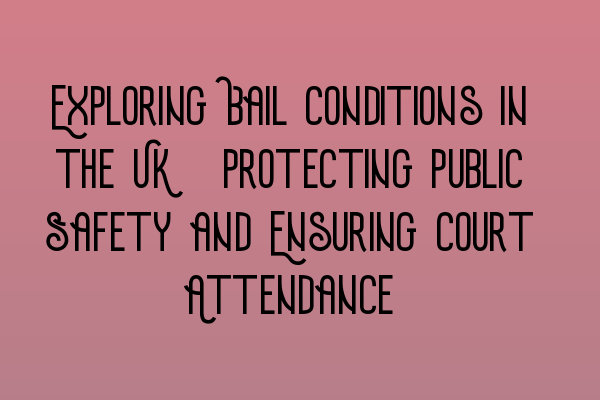Exploring Bail Conditions in the UK: Protecting Public Safety and Ensuring Court Attendance
When individuals are charged with a criminal offense in the UK, there are several factors that the court must consider when deciding whether to grant them bail. Bail is a legal concept that allows the accused to be released from custody while awaiting trial. However, in order to prevent potential harm to the public and ensure the accused’s compliance with court proceedings, the court may impose certain bail conditions.
Why Bail Conditions are Necessary
Bail conditions serve two essential purposes: protecting public safety and ensuring court attendance. By imposing conditions, the court aims to minimize the risk that the accused will engage in further criminal activity while out on bail. Additionally, these conditions help ensure that the accused will appear in court as required, thus safeguarding the integrity of the legal process.
Common bail conditions often include:
- Regular reporting to a police station
- Restrictions on travel or passport surrender
- Prohibitions on contact with certain individuals or victims
- Curfews
- Electronic monitoring
These conditions are tailored to the specific circumstances of each case and are designed to mitigate the risk posed by the accused individual.
The Impact of Bail Conditions on the Accused
While bail conditions are imposed with the intention of protecting the public and ensuring court attendance, they can have a significant impact on the accused’s daily life. Depending on the severity of the alleged offense, the conditions may restrict their freedom and impose significant limitations on their personal and professional lives.
For some individuals, the curfews and reporting requirements may make it challenging to maintain employment or attend to family responsibilities. In cases where travel restrictions are imposed, the accused may face difficulty accessing necessary support or even leaving the country for valid reasons.
However, it’s important to note that the court must strike a balance between protecting public safety and preserving the rights of the accused. Bail conditions should be proportionate to the alleged offense and based on the individual circumstances of the case.
The Role of Legal Representation in Bail Condition Hearings
For individuals facing bail conditions, legal representation plays a crucial role in ensuring their rights are protected. Solicitors who specialize in criminal law are well-versed in the complexities of bail applications and can provide invaluable guidance throughout the process.
If you are in need of legal representation or information on the SQE (Solicitors Qualifying Examination), our team at SQE Criminal Law & Practice Law UK can provide expert advice and support. Our extensive knowledge of criminal law allows us to navigate bail condition hearings effectively and advocate for the best possible outcome for our clients.
Conclusion
Bail conditions in the UK are carefully considered by the court to protect public safety and ensure court attendance. These conditions aim to minimize the risk of further criminal activity while allowing the accused to await trial outside of custody. While they may impose limitations on the accused’s freedom, it is crucial that the conditions are proportionate and consider the individual circumstances of each case. Legal representation is instrumental in navigating bail condition hearings and ensuring the rights of the accused are upheld throughout the process.
If you require legal representation or further information on the SQE (Solicitors Qualifying Examination), do not hesitate to contact SQE Criminal Law & Practice Law UK for expert advice. Additionally, you may find the following related articles helpful:
- SQE 1 Practice Exam Questions
- SQE 1 Practice Mocks FLK1 FLK2
- SQE 2 Preparation Courses
- SQE 1 Preparation Courses
- SRA SQE Exam Dates
